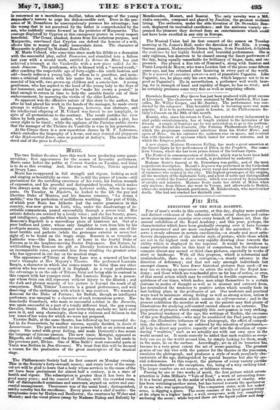Rusir.
The two Italian theatres have this week been producing some quasi- novelties; first appearances for the season of favourite performers. Mario came before the public at Covent Garden on Tuesday, and Grisi is to do so this evening. And, likewise on Tuesday, Titiena appeared at Drury Lane. Mario has re-appeared in full strength and vigour, looking as well and singing as beautifully as ever. He is still the prince of tenors—still preeminent for the ravishing sweetness of his voice, his Italian warmth of expression, and his graceful and distinguished bearing, which makes him always seem the very personage, however noble, whom he repre- sents. On Tuesday, in Rigoletto, he looked to the life the gay and libertine Duke of Mantua, and his famous romance, "La donna 6 mobile," was the perfection of mellifluous warbling. The part of Gilds, of which poor Bosco has hitherto had the entire possession in this country, was now given to Lotti, who, under the disadvantage of in- evitablo comparisons, passed successfully through a severe trial. Her artistic defects are covered by a lovely voice ; and she has beauty, grace, and intelligence, qualities which insure her against failing as an actress. Ronconi's Rigoletti is a marvellous piece of histrionic art. Out of a poor buffoon and jester, whose only daughter is torn from him by his profligate master, this consummate actor elaborates a part, one of the most terrible and pathetic (while the grotesque exterior is never lost sight of) to be found on the tragic stage. Ronconi is as versatile as Lablache was—like him, as much at home in the fearful Duke of Ferrara as in the laughter-moving Doctor Dulcamara. But Nature, by withholding from Ronconi the gift so liberally bestowed on Lablache, an incomparable voice, prevented him from rivalling the greatest actor who has appeared in our day on the musical stage. The appearance of Titiens at Drury Lane was a renewal of her last vear's triumphs at Her Majesty's Theatre. She performed Lucrezia Borgia, a character in which she comes nearer to Grisi than any other actress who has ever essayed. it in England. As a vocal performance the advantage is on the side of Titiens, Grisi not being able to contend in this respect with her younger rival. But Lucrezia Borgia is a person- age whom Grisi can still represent without injury to the illusion ; and the dark and gloomy majesty of her picture is beyond the reach of all comparieon. Still, Titiens' Lucrezia is a grand performance, and well deserving of the enthusiasm with which it was received. We wanted a Ronconi for the Duke of Ferrara ; for Badiali, though an intelligent performer, was unequal to a character of such tremendous power. Ma- demoiselle Guarducci, who made so successful a debut in the Favorite, was again successful in a part of a totally different kind, the gay young Cavalier, Orsini. She looked the part better than anybody we have ever seen in it, and sang charmingly, showing a richness and fellness in the low tones of her voice for which we were not prepared. Victoire Balfe, at the same theatre, has followed up her successful de- but in La Sonnambula, by another (success, equally decided, in Lucia di Lammermoor. The part is suited to her powers both as an actress and a singer. She acted with great feeling, and made Donizetti's fine music the language of intense passion. The new tenor, Mongini, appeared as Edgard°, and fully confirmed the favourable impression he had made in his previous part, Elvino.. One of Miss Balfe's most successful parts at Turin was Zerlina in Don Giovanni, We trust that this will be deemed a reason for the production of the great masterpiece of the musical stage.


























 Previous page
Previous page